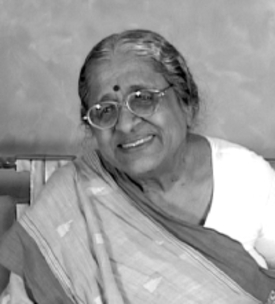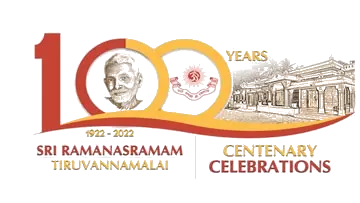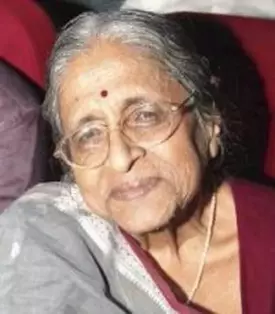Table of Contents
1. Calendar of Ashram Events 2. In Profile: Susri Dhiruben Patel (1926-2023) 3. Bhagavan’s Handwriting: Muruganar’s ‘Decad of Miracle’ (v. 9) 4. Events in Sri Ramanasramam: Sundaram Iyer Day 5. Events in Sri Ramanasramam: Sri Vidya Havan 6. Events in Sri Ramanasramam: Athi Rudram 7. Special Feature: Why Do We Perform Athi Rudram? 8. Wisdom of the Ether: Resonance and Harmonics of Being (pt III) 9. Announcement: Sri Ramana Sannidhi Murai 10. Events in Sri Ramanasramam: Athi Rudram Flash Flood 11. Events in Sri Ramanasramam: Athi Rudram in the Past 12. Sri Bhagavan’s Ayurvedic Recipes: Vikkal Marundu 13. Announcement: Daily Live Streaming 14. Events in Sri Ramanasramam: Athi Rudram Evening Events
Smt.Dhiruben Patel
In Profile
In Profile
Susri Dhiruben Patel

Born 29th May 1926 in Dharmaj village, Vadodara, Gujarat, Dhiruben grew up in Santacruz, Mumbai among very interesting company. Her father, Gordhanbhai Patel, was a journalist with the Bombay Chronicle, and her mother, Gangaben Patel was a freedom fighter and member of the All-India Congress Committee. Jailed six times for her independence activities, Dhiruben’s mother practiced Gandhian non-violent resistance alongside the great women of the day. Her comrades-in-arms were Sarojini Naidu, Kamaladevi Chattopadhyay and Usha Mehta, all three of which were freedom fighters. Sarojini became the first woman President of the Congress in 1925. Usha organised the Secret Congress Radio for which she was jailed in 1942, and Kamala was the first lady in India to stand in elections and the driving force behind the revival of Indian handicrafts and theatre. Clear-eyed trailblazers, all three were accomplished writers. Such was the greatness that surrounded Dhiruben during her formative years. She would be inspired to strive in similar ways from an early age. As a baby, Dhiruben slept in the lap of Gandhiji, and as an adult, she formed a close working relationship with Usha Mehta.
Though Sarojini Naidu was the sister of the devout Ramana devotee, Harindranath Chattopadhyay (the famed poet-writer), and though Kamaladevi Chattopadhyay was Harindranath’s wife, it was not through these women that Dhiruben’s mother came to Bhagavan. Rather it had been a family friend in Bombay, Chhaganlal Yogi, who brought them to Ramanasramam. He had come to Bhagavan at the insistence of a colleague in 1939, only intending to spend a few hours at the Ashram. When Bhagavan asked him to chant some verses from the Gujarati translation of Upadesa Saram, Chhaganlal was compelled to sit before Bhagavan and be observed at close range. In these few minutes of recitation before the meal, the complexion of the situation changed. By the time he went into the dining hall, he knew that he had to stay overnight. Instead, he stayed on for three days, an experience which proved transformative. Chhaganlal Yogi communicated his experience to the Patel family, but it was only when the family suffered a tragedy five years later that they were induced to come. Dhiruben narrates:
My mother, Gangaben Patel, was very badly shaken along with the whole family by a tragic misfortune that occurred in 1944. My eldest brother met with a drowning accident, which my mother witnessed from the shore. After a few months, Mr.Chhaganlal Yogi suggested that she should go to Sri Ramanasramam. At the time we were living in Santa Cruz, Bombay. When my mother came to Sri Ramanasramam and saw Bhagavan for the first time, she was so impressed that she came back to take the whole family. So that is how I, my father and my newly widowed sister-in-law came to Sri Ramanasramam.
At the time, Dhiruben was only eighteen years old and had no interest in taking the long train journey to visit an Ashram or a guru. She describes the journey:
Those were the days of World War II, around 1945, and en route, when we reached Villupuram, some British soldiers wanted to get into our first-class compartment, so we were asked to vacate. We were compelled to wait on the Villupuram platform the whole night. This was a very bad experience for me. In the morning we got the bus to Tiruvannamalai rather late, so it was almost twilight when we reached the Ashram. I was so tired and so dirty that my only thought was to go and have a wash and a drink of cold water. But my mother — oh, she was ever the dictator! — said, ‘No, as soon as you enter the Ashram, the first thing you must do is to go and have Bhagavan’s darshan.’
Dhiruben had inherited some of the fierce independence of her mother but could also be obedient:
I was very reluctant, but those were not the days when children could argue with their parents, so I had to agree, and I followed my mother’s instructions. There I saw the Old Hall where Bhagavan was sitting along with one or two attendants standing nearby. Next to Bhagavan I saw a small vessel in which charcoals were burning. I took that one step up to go into the hall to give my namaskar. I did it by impatiently joining my hands and bowing. I just wanted to get it over with as soon as possible. I was not interested in Bhagavan or having his darshan. As I couldn’t defy my mother, I had to do it. So, with closed eyes, I just did it.
Then the same thing that had happened to Chhaganlal and so many others over the years. Everything shifted:
When I raised my head, I can’t find words to describe what happened to me. As soon as Bhagavan’s gaze met mine, he looked at me and in that very second it seemed that I was annihilated. I didn’t exist any longer and there was a great sense of release and peace, and there was light, but not strong light. It was like a soft moonlight all around me, with no boundaries and no barriers anywhere. It was as if I was lost in a sky of light and peace. And I don’t know how many minutes or how many seconds I was in that state. When I came back to my material existence, I just could not accept what had happened.
The family stayed five days and Dhiruben had Bhagavan’s darshan several times per day, though the experience of the first day was never repeated:
It happened only once, but it made me think very deeply and continuously: ‘What was it? And how can I be in that state constantly?’
Now the young girl felt inclined to participate in the exchanges between devotees and the teacher, understanding intuitively that there was something here to be gained:
When on the next day after having our bath, we sat in the hall along with the other devotees and Bhagavan was there and anybody who wanted to ask a question could ask. I wrote two questions on a piece of paper and handed it over to the attendant. He then told me that I should sit quietly, and I will get the answers. But being young and impatient I was unable to wait, so after some time I again bothered the attendant. I told him I was not getting any answers. The silent questioning was not working. So, I went near the couch where Bhagavan was sitting and insisted on getting my answers. Then, Bhagavan gave some answer, which of course I couldn’t understand because he was talking in Tamil. Someone was interpreting, so I asked him to explain Bhagavan’s answers.
‘If two persons are sleeping and one person has a dream of a tiger and is frightened and the other person is awake sitting by his side, is it not the duty of the second one to wake up the dreaming person so that he will no longer be afraid? Why doesn’t he do it?’ That was my first question, to which Bhagavan gave the explanation that the dream state belongs to the person who is asleep and the person who is awake has only to wait for the moment of wakefulness occurring to the person who is sleeping. There is no question of saving the dreamer because there is no tiger.
My second question was: ‘Bhagavan, when I look at the mirror for a long time and try to understand who I am, I don’t get the answer, but on the contrary, I feel frightened looking at my own reflection. What should I do?’ He told me: ‘Don’t look in the mirror. Why is it necessary to look in the mirror? Go inwards and find out who you are.’
This incident happened on the second day of my visit. Being with Bhagavan and noticing his every movement and listening to his voice, I am unable to describe it in words. Being there with him was the most wonderful event of my life.
Dhiruben’s mother came regularly and used to rent a cottage near the Ashram and stay for two or three months at a time. Dhiruben tells us:
My mother was a sincere soul and a self-educated woman. She had very little school education, hardly two or three years. Nevertheless, she learned Hindi, English, Sanskrit and wrote in Gujarati. But when she came here, she found that all this was of no use because Bhagavan talked mostly in Tamil and rarely in English. My mother had such an irresistible attraction towards Bhagavan and his teachings that she used to stay here and meditate very regularly, despite all the other work that she was doing. What happened to her here, she spoke little of.
Dhiruben tells of another incident between a family member and Bhagavan. It was her two-year-old nephew who came to the Ashram with Dhiruben’s mother:
As usual, Bhagavan was going for his walk after lunch on the hill, and all devotees were standing in a row. My nephew was there. Suddenly he saw Bhagavan and ran to him, taking hold of his walking stick and holding it so firmly that he wouldn’t allow Bhagavan to budge. Everybody was aghast and requested the child to go away and not to bother Bhagavan. But he didn’t listen. And for a long time, he went on staring at Bhagavan. Bhagavan put his hand on the boy’s head. At once he let go of the stick and started weeping, not loudly, but tears were streaming down his cheeks while he just stood looking at Bhagavan.
It would be several years before Dhiruben would see Bhagavan again. In her 24th year, she came for what would be her last darshan. It was the spring of 1950 and Bhagavan was not well. He sat on his couch with a bandage on his arm. Dhiruben narrates:
People filed by, single file, going quietly. When I came near him, I couldn’t help saying, ‘Bhagavan, call me again.’ Then, with infinite compassion, and immense love, he looked at me. Then he said, ‘Sari, sari,’ in Tamil. I didn’t understand what ‘sari’ meant. Someone told me later that, it meant ‘Alright, alright.’
Dhiruben never saw Bhagavan in the body again. Meanwhile, her mother also grew old and one day, suffered a paralytic stroke. She was not able to speak at all:
After a month and a half, gradually her speech began to come back. But then, it was not fluent, and we could not understand her. For example, if she wanted her shoes, she would ask for soap and then would sometimes get annoyed because we couldn’t understand her. Everybody was depressed about this, and we felt sad that such a wonderful person as my mother might have to end her life in this condition. All of a sudden, I remembered the evening parayana of Upadesa Sarah and recited one or two lines before her. My mother was at once alert and picked up the recitation and concluded the thirty verses without a single mistake. After this she was able to recite Bhagavan’s works and slowly, she then became normal. She wrote her autobiography also.
In her last illness she made me promise that nobody would weep when she goes and that Bhagavan should be with her, and that I should be the one responsible for these requests. She insisted that I must do this. So, I replied, ‘How can I do that? Who knows when the last minute in a person’s life will come?’ Still, she made me promise. And by God’s grace and Bhagavan’s blessing it happened just as she had wished.During her last moments I was there and this nephew of mine held a very big, framed photograph of Bhagavan before her eyes. She quietly gazed at the photograph and then turned her eyes and passed away. And in many ways, I have always felt Bhagavan’s loving presence.
It was not until 2007 that Dhiruben made her return journey to Ramanasramam. Her decision to come after so long happened this way. The nephew who had taken hold of Bhagavan’s walking stick as a youngster had grown old and was now in the hospital. His condition was serious:
When I went to the hospital each day, my nephew would tell me, ‘Foie [Auntie], do you know what we are going to do as soon as these doctors leave me and I am able to go out?’ I said, ‘I don’t know.’ He said, ‘We will go to Ramanasramam. That will be the first thing we do. And only you and I will go.’
Now it is no longer possible since he is no more, I thought that it is now my duty to go to Ramanasramam. I thought that I will go alone, stay there and find out if Bhagavan’s presence is still felt. Whether I am here or there, I tell you I feel that Bhagavan is with me. And that is all due to the first wonderful moment when he looked at me that day in the Darshan Hall.[1]







After meeting Bhagavan as a young woman, Dhiruben Patel went on to complete a B.A. in English literature in 1945, and an M.A. from Bhavan’s College in 1949. She never married but taught English at Bharatiya Vidya Bhavan and became an acclaimed writer, publishing more than fifty books in Gujarati, including novels, short stories, poems, translations, and children’s books. Her diverse career as professor, foundress of women-writers’ organisations, foundress of two independent publishing houses, president of Gujarat Sahitya Parishad, scriptwriter for radio, television, theatre and film and an aircraft pilot, she remained a Gandhian throughout and wore only khadi saris. She edited the respected Gujarati journal, Sudha, and her stage play, ‘Mummy, Tu Aavi Kevi?’ was a big hit on the Gujarati circuit with 60-plus performances. Two of her works received national attention, ‘Bhavni Bhavai’ (1980), Ketan Mehta’s film which won a National Award; and a novel called ‘Agantuk’ (2002), for which she won the prestigious Sahitya Akademi Prize for literature. She received the Ranjitram Suvarna Chandrak award in 1980, the K.M.Munshi Suvarna Chandrak award in 1981 and the Sahitya Gaurav Puraskar award in 2002.
Respected writers called her an 11th-hour writer and marvelled at her ability to ‘frame her words in her mind’, writing in one sitting, without rewriting, editing, or proofing.
On 10th March, 2023 at the age of 96, Susri Dhiruben Patel passed away following a brief illness.


